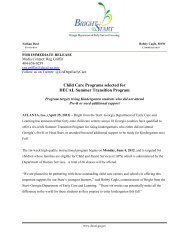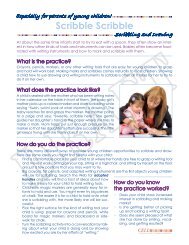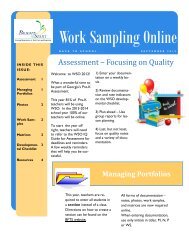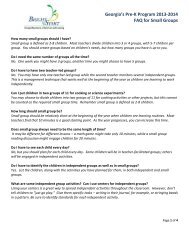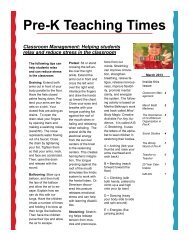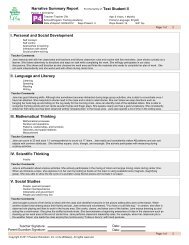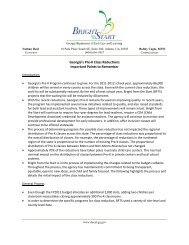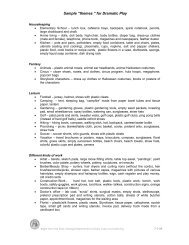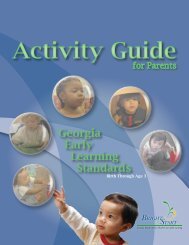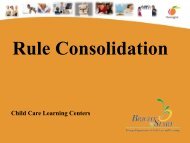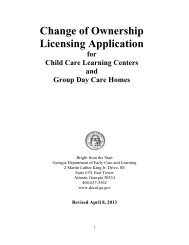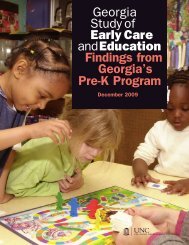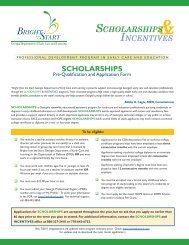Georgia Study of Early Care and Education: Child - Bright from the ...
Georgia Study of Early Care and Education: Child - Bright from the ...
Georgia Study of Early Care and Education: Child - Bright from the ...
Create successful ePaper yourself
Turn your PDF publications into a flip-book with our unique Google optimized e-Paper software.
<strong>Georgia</strong> <strong>Study</strong> <strong>of</strong> <strong>Early</strong> <strong>Care</strong> <strong>and</strong> <strong>Education</strong>: <strong>Child</strong> <strong>Care</strong> Center Findings<br />
Similar findings <strong>of</strong> low quality were evident in <strong>the</strong> more specific measure <strong>of</strong> quality<br />
related to children’s language <strong>and</strong> literacy. The data <strong>from</strong> <strong>the</strong> ELLCO suggest that<br />
most preschool children are not in environments that support <strong>the</strong>ir language/literacy<br />
skills. None <strong>of</strong> <strong>the</strong> preschool classrooms in child care centers were in <strong>the</strong> “strong”<br />
or “exemplary” categories on <strong>the</strong> ELLCO Language <strong>and</strong> Literacy Environment.<br />
Eighty percent <strong>of</strong> preschool classrooms were, in fact, rated as having “deficient” or<br />
“inadequate” language <strong>and</strong> literacy practices.<br />
Additional efforts are needed to improve <strong>the</strong> quality <strong>of</strong> infant/toddler centerbased<br />
care in <strong>Georgia</strong>. The fact that two-thirds <strong>of</strong> infant/toddler classrooms in <strong>the</strong><br />
study were rated as low quality is particularly troubling. With research documenting<br />
<strong>the</strong> importance <strong>of</strong> early brain development, 16 it seems especially important to<br />
streng<strong>the</strong>n <strong>the</strong> quality <strong>of</strong> center-based care for infants <strong>and</strong> toddlers in <strong>Georgia</strong>.<br />
Continued education <strong>and</strong> pr<strong>of</strong>essional development are important strategies<br />
for improving <strong>the</strong> quality <strong>of</strong> care for <strong>Georgia</strong>’s children in child care centers.<br />
The variability among teacher education levels will require careful planning <strong>of</strong> <strong>the</strong><br />
specific in-service pr<strong>of</strong>essional development efforts <strong>and</strong> supports that best match<br />
a teacher’s needs for streng<strong>the</strong>ning her teaching practices. Extra supports may be<br />
needed to meet <strong>the</strong> needs <strong>of</strong> <strong>the</strong> sizable portion <strong>of</strong> teachers without degrees beyond<br />
high school. Of lead teachers, 77% in infant/toddler classrooms <strong>and</strong> 67% in preschool<br />
classrooms did not have an Associate’s, Bachelor’s, or Graduate degree. Of assistant<br />
teachers, 81% in infant/toddler classrooms <strong>and</strong> 70% in preschool classrooms did not<br />
have an Associate’s, Bachelor’s, or Graduate degree. With so many classrooms in <strong>the</strong><br />
low quality range, special supports also may be needed to first emphasize basic health<br />
<strong>and</strong> safety issues <strong>of</strong> caring for young children as well as a general underst<strong>and</strong>ing <strong>of</strong><br />
appropriate expectations for young children.<br />
The amount <strong>and</strong> quality <strong>of</strong> pr<strong>of</strong>essional development may also need to be improved.<br />
For example, although most directors (63%) <strong>and</strong> preschool teachers (52%) reported<br />
receiving in-service training related to language <strong>and</strong> literacy in <strong>the</strong> past year, <strong>the</strong><br />
data suggest that <strong>the</strong> in-service training has not yet translated into literacy-rich<br />
classroom environments <strong>and</strong> teaching practices. It is likely that more or different<br />
pr<strong>of</strong>essional development <strong>and</strong> supports are needed to ensure that children have <strong>the</strong><br />
materials, activities, <strong>and</strong> experiences necessary to support <strong>the</strong>ir language <strong>and</strong> literacy<br />
development. As ano<strong>the</strong>r example, many teachers reported participating in more than<br />
<strong>the</strong> required annual in-service training hours, <strong>and</strong> yet quality <strong>of</strong> care was still in <strong>the</strong><br />
low to medium range. It may be useful for DECAL to examine <strong>the</strong> existing training <strong>and</strong><br />
technical assistance supports <strong>of</strong>fered to child care center teachers <strong>and</strong> make revisions,<br />
moving toward building a system <strong>of</strong> pr<strong>of</strong>essional development that is aligned with <strong>the</strong><br />
state’s early learning st<strong>and</strong>ards <strong>and</strong> goals for quality improvement <strong>and</strong> is guided by<br />
research on effective training <strong>and</strong> technical assistance. 17, 18, 19<br />
19




